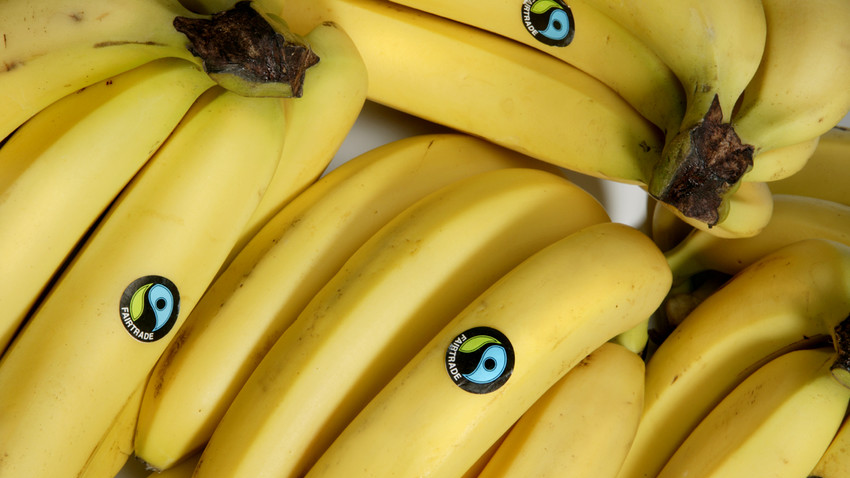Thought you knew everything about bananas? Think again! This Banana Lovers’ Day, the Fairtrade Foundation will launch a mini campaign across its channels to deliver the low-down on the nation’s favourite fruit and reveal everything you need to know about how to celebrate the humble banana!
The campaign will showcase inspiring Fairtrade farmer stories about a Colombian women’s group with a waste-free banana business. It will also feature a banana lover’s checklist, together with brand new materials in celebration of the five UK retailers that are committed to selling 100% Fairtrade bananas.
As part of the initiative, Fairtrade is collaborating with Caught Creating, the folks behind the successful Caught Snackin’ TikTok account on an exciting new video.
The brilliant banana is one of the nation’s favourite fruits, but not all banana lovers know that:
🍌 Bananas are classified as a fruit, but are also an herb. They are also distantly related to ginger.
🍌 Fairtrade supports 22,000 banana farmers and workers to receive a fair wage and decent working conditions.
🍌 In the UK, people eat an average of 5 billion bananas per year.
🍌 1 in 3 bananas bought in the UK is Fairtrade, making a huge difference to thousands of farmers, workers and their families. But if all bananas bought in the UK were Fairtrade, banana farmers worldwide would be much better off.
Despite their broad appeal, in the last decade the price of a banana bought in a UK supermarket has dropped from around 18p to just 11p. While supermarkets have almost halved the shelf price of loose bananas, the cost of producing them has doubled. This means that many banana farmers and workers’ standard of living have progressively worsened – this is simply not right, says the Fairtrade Foundation.
At the same time, Panama disease is posing a big challenge for banana farmers – and climate change is making it worse. Caused by a fungus which attacks the roots of banana plants, it has wreaked havoc on banana plantations across Asia and has now reached Latin America.
Choosing Fairtrade bananas means that banana farmers have the safety net of the Fairtrade Minimum Price, as well as the Fairtrade Premium. Between 2000 and 2020, Fairtrade banana sales in the UK generated over £114 million in Fairtrade Premium for farmers and workers.
You can support farmers by always looking for the FAIRTRADE Mark when buying bananas. There are five UK retailers who sell only Fairtrade bananas: Sainsbury’s, Co-op, Waitrose & Partners, Ocado and Booths.
The real-life impact of Fairtrade in bananas
This retail commitment has a real life impact every day. The members of ASOCOOMAG Women’s Group, set up using the Fairtrade Premium with support from trading partner Fyffes, are all connected to the five Fairtrade certified banana co-operatives in the Magdalena region of northern Colombia.
Since the group’s beginnings in 2019, they have found creative ways to transform not just the fruit, peel and leaves, but also the gloves and plastic bags used to harvest bananas, into a wide range of products. In their hands, plastic bags become toys and furniture, and banana leaves become earrings and lampshades.
Ibeth, a member of the ASOCOOMAG Women’s Group says: ‘The Zona Bananera we live and work in has faced many difficulties. This group has motivated us to take control and create projects for our future generations. The handicrafts group represents colour, diversity, and innovation for forward-thinking producers. It has made us feel useful. We give thanks to Fairtrade, because through them we are achieving sustainability.’
Another group member, Feris, said: ‘Our gastronomy group manufactures completely organic products with bananas and banana flour. We all love to cook. We know the banana is a delicious fruit from which you can make a variety of things without wasting anything. Even the peel can be made into custard.
‘My mother taught me that the banana was a treasure. We can make so many things from it. We did not think that the banana could become so big in all senses of the word. For this we would like to give our thanks and we would like to continue learning.’
Climate change and COVID-19 have increased the cost of growing bananas however the retail price of bananas remains very low. More hurricanes and frequent floods make earning a living from bananas unpredictable and unsustainable. With prices for bananas so low, it’s hard for farmers to build up enough savings for emergencies.
That’s why Fairtrade can be a lifeline to farmers. On top of the price farmers receive for their produce, they earn an extra sum of money, called the Fairtrade Premium, to invest in improving the quality of their lives. Las Mercedes Fairtrade co-operative in the Dominican Republic have used the Premium to develop a disaster recovery fund. When severe weather hits their farms, the co-operative’s members use the fund to rebuild.
So, this Banana Lovers’ Day, remember to look for the FAIRTRADE Mark. Because when you choose Fairtrade, you know your purchase has real power. Want to know how to celebrate Banana Lovers’ Day the Fairtrade way? Check out the Fairtrade Foundation’s social media pages for more updates. Find us on Instagram @fairtradeuk and on Twitter @FairtradeUK.
For more information, photos, or to request an interview with a banana farmer, please contact mollie.letherensmith@fairtrade.org.uk
NOTES FOR EDITORS
About Fairtrade
Fairtrade changes the way trade works through better prices, decent working conditions, and a fairer deal for farmers and workers in low-income countries.
Fairtrade International is an independent non-profit organization representing 1.7 million small-scale farmers and workers worldwide. It owns the FAIRTRADE Mark, a registered trademark of Fairtrade that appears on more than 30,000 products. Beyond certification, Fairtrade International and its member organizations empower producers, partner with businesses, engage consumers, and advocate for a fair and sustainable future. Find out more at http://www.fairtrade.net.
